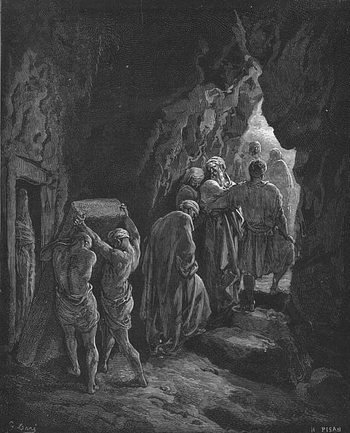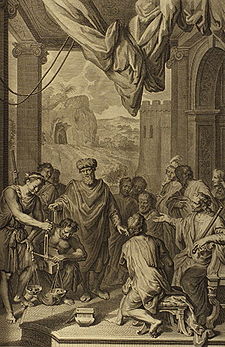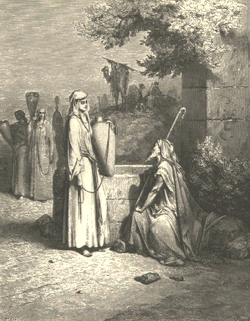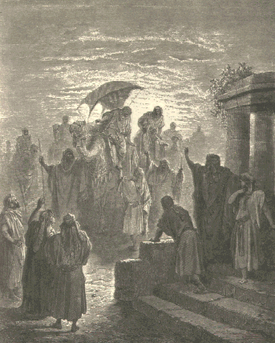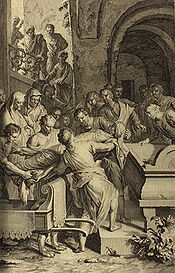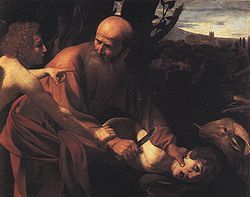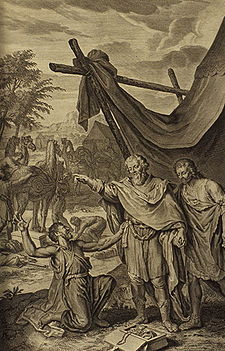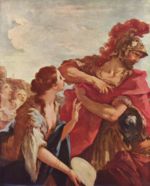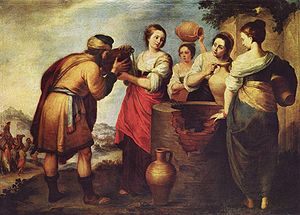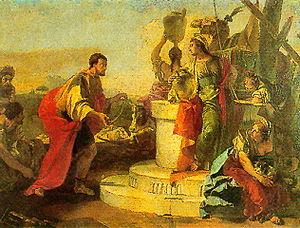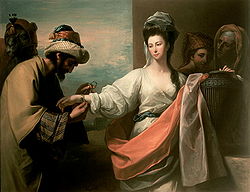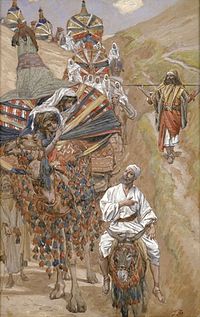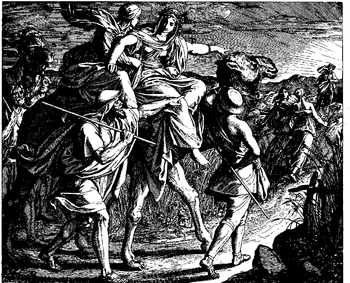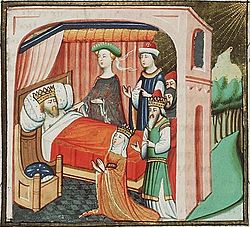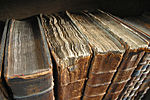- Chayei Sarah
-
Chayei Sarah, Chaye Sarah, or Hayye Sarah (חַיֵּי שָׂרָה — Hebrew for “life of Sarah,” the first words in the parshah) is the fifth weekly Torah portion (parshah) in the annual Jewish cycle of Torah reading. It constitutes Genesis 23:1–25:18. Jews read it on the fifth Sabbath after Simchat Torah, generally in November.
Contents
Summary
A burial place for Sarah
Sarah lived 127 years and died in Hebron, and Abraham mourned for her. (Genesis 23:1–2) Abraham asked the Hittites to sell him a burial site, and the Hittites invited him to bury his dead in the choicest of their burial places. (Genesis 23:3–6) Abraham asked the Hittites to intercede for him with Ephron son of Zohar to sell Abraham the cave of Machpelah at full price. (Genesis 23:7–9) Before the Hittites at the town gate, Ephron offered to give Abraham the field and the cave that was in it, but Abraham insisted on paying the price of the land. (Genesis 23:10–13) Ephron named the value of the land at 400 shekels of silver and Abraham accepted Ephron's terms, gave him the silver, and purchased the land. (Genesis 23:14–18) Abraham buried Sarah in the cave. (Genesis 23:19)
A wife for Isaac
Abraham was old, and instructed his senior servant to put his hand under Abraham’s thigh and swear by God that he would not take a wife for Isaac from the Canaanites, but would go to the land of Abraham’s birth to get Isaac a wife. (Genesis 24:1–4) The servant asked if the woman did not consent to follow him to Canaan, should he take Isaac back to the land from which Abraham came? (Genesis 24:5–6) Abraham told him on no account to take Isaac back there, for God — who took Abraham from there and promised Abraham the land of Canaan for his offspring — would send an angel before the servant and allow him successfully to get a wife for Isaac from there, and if the woman did not consent to follow him, he would then be clear of his oath. (Genesis 24:7–8) So the servant put his hand under Abraham’s thigh and swore to him as Abraham had asked. (Genesis 24:9)
Rebekah by the well
The servant took Abraham’s bounty and ten of Abraham’s camels and traveled to Aram-Naharaim, the city of Nahor. (Genesis 24:9) He made the camels kneel by the well outside the city at evening, when women come out to draw water. (Genesis 24:10) The servant asked God to grant that the maiden whom he would ask to draw water for him and who replied by offering also to water his camels might be the one whom God had decreed for Isaac. (Genesis 24:11–14) He had scarcely finished speaking when Rebekah, the beautiful virgin daughter of Abraham's nephew Bethuel, came out with her jar on her shoulder, went down to the spring, filled her jar, and came up. (Genesis 24:15–16) The servant ran toward her and asked to sip a little water from her jar, and she quickly let him drink and when he had drunk his fill, she offered to draw water for his camels until they finish drinking. (Genesis 24:17–19) When the camels had finished drinking, the servant took a gold nose-ring and two gold bands for her arms, and asked her whose daughter she was and whether there was room in her father's house for him to spend the night. (Genesis 24:22–23) She identified herself and told him that there was plenty of straw and feed and room at her home for him to spend the night. (Genesis 24:24–25) The servant bowed low to God and blessed God for steadfast faithfulness to Abraham. (Genesis 24:26–27)
Terah Hagar Abraham Sarah Haran Nahor Milcah Iscah Lot Bethuel Moab Ben-ammi Ishmael Isaac Rebekah Laban Rebekah’s mother’s household
Rebekah ran and told everything to her mother's household. (Genesis 24:28) Rebekah’s brother Laban ran out to the servant at the spring, and when he saw the nose-ring and the bands on Rebekah’s arms, and when he heard his sister tell the story, Laban invited the servant to their house, had the camels unloaded and fed, and had water brought to bathe the feet of the servant and his party. (Genesis 24:28–32) But the servant would not eat before he had told his tale. (Genesis 24:33) The servant told how God had greatly blessed Abraham with sheep and cattle, silver and gold, male and female slaves, camels and asses, and a son and sole heir. (Genesis 24:34–36) The servant told how Abraham made him swear to go to Abraham’s kindred to get Isaac a wife, and that God would send an angel to make his errand successful. (Genesis 24:37–40) And the servant told how he met Rebekah at the well. (Genesis 24:42–48) The servant then asked whether or not they meant to treat Abraham with true kindness, and Laban and Bethuel answered that the matter had been decreed by God and Rebekah could go and be Isaac’s wife. (Genesis 24:49–51) The servant bowed low to God and brought out silver, gold, and garments for Rebekah and presents for her brother and her mother. (Genesis 24:52–53) Then the servant and his party ate, drank, and spent the night. (Genesis 24:54) The next morning, the servant asked leave to return to Abraham, but Laban and her mother asked that Rebekah remain a period of time. (Genesis 24:54–55) The servant persisted, so they called Rebekah to ask for her reply, and she agreed to go. (Genesis 24:56–58) So they blessed Rebekah — wishing that her children be thousands of myriads and seize the gates of their foes — and they sent off Rebekah and her nurse with the servant. (Genesis 24:59–60)
Isaac meets Rebekah
Isaac had just come back from the vicinity of Beer-lahai-roi to his home in the Negeb and was out walking in the field toward evening when he looked up and saw camels approaching. (Genesis 24:62–63) Raising her eyes, Rebekah saw Isaac, alighted from the camel, and asked the servant who the man was. (Genesis 24:64–65) The servant said that Isaac was his master, so she covered herself with her veil. (Genesis 24:65) The servant told Isaac everything that had happened, and Isaac brought her into Sarah’s tent and took her as his wife. (Genesis 24:66–67) Isaac loved Rebekah, and found comfort after his mother's death. (Genesis 24:67)
Family matters
Abraham took another wife, named Keturah, who bore him Zimran, Jokshan, Medan, Midian, Ishbak, and Shuah. (Genesis 25:1–2) Abraham willed all that he owned to Isaac, but to his sons by concubines he gave gifts while he was still living, and he sent them away from his son Isaac to the land of the East. (Genesis 25:5–6)
Sons of Abraham by wife in order of birth Hagar Ishmael (1) Sarah Isaac (2) Keturah Zimran Jokshan Medan Midian Ishbak Shuah
Abraham lived 175 years and died old and contented. (Genesis 25:7–8) Isaac and Ishmael buried him in the cave of Machpelah with Sarah. (Genesis 25:9–10) After Abraham’s death, God blessed Isaac and he settled near Beer-lahai-roi. (Genesis 25:11)Ishmael had 12 sons, who became chieftains of 12 tribes. (Genesis 25:12–16) Ishmael lived 137 years and then died. (Genesis 25:17) Ishmael’s progeny dwelt in lands all the way from Havilah, near Egypt, to Asshur. (Genesis 25:18)
Sons of Ishmael in order of birth (Genesis) Nebaioth | Kedar | Adbeel | Mibsam | Mishma | Dumah | Massa | Hadad | Tema | Jetur | Naphish | Kedemah In inner-Biblical interpretation
Genesis chapter 23
The 400 shekels of silver that Abraham paid Ephron the Hittite to buy the cave of Machpelah and adjoining land in Genesis 23:14–16 compares with the 100 pieces of silver that Jacob paid the children of Hamor for the parcel of ground where he had spread his tent outside the city of Shechem in Genesis 33:18–19; the 50 shekels of silver that King David paid Araunah the Jebusite for Araunah’s threshing floor, oxen, and wood in 2 Samuel 24:18–24 (but 1 Chronicles 21:24 reports cost 600 shekels of gold); and the 17 shekels of silver that Jeremiah paid his cousin Hanamel for his field in Anathoth in the land of Benjamin in Jeremiah 32:7–9.
The cave of Machpelah in which Genesis 23:18 reports Abraham buried Sarah later became the burial site for Abraham himself (as reported in Genesis 25:8–10) and thereafter Isaac, Rebekah, Leah, and Jacob (as reported in Genesis 49:29–31).
Genesis chapter 24
The story of Eliezer’s mission to get a wife for Isaac is told twice, once by the narrator in Genesis 24:1–27, and then a second time by Abraham’s servant in Genesis 24:34–48. Isaac Abrabanel and other commentators noted a number of differences between the two recountings. (See, e.g., Yehudah Nachshoni. Studies in the Weekly Parashah: The Classical Interpretations of Major Topics and Themes in the Torah, 114–16. Brooklyn: Mesorah Publications, 1988. ISBN 0-89906-933-9.)
Genesis 24:1–27 As Told by the Narrator
Genesis 24:34–48 As Told by Abraham’s Servant
1 And Abraham was old, well stricken in age; and the Lord had blessed Abraham in all things. 35 And the Lord has blessed my master greatly; and he is become great; and He has given him flocks and herds, and silver and gold, and men-servants and maid-servants, and camels and asses. 36 And Sarah my master’s wife bore a son to my master when she was old; and to him has he given all that he has.
2 And Abraham said to his servant, the elder of his house, that ruled over all that he had: “Put, I pray you, your hand under my thigh. 34 And he said: “I am Abraham’s servant. 3 And I will make you swear by the Lord, the God of heaven and the God of the earth, that you shall not take a wife for my son of the daughters of the Canaanites, among whom I dwell. 37 And my master made me swear, saying: You shall not take a wife for my son of the daughters of the Canaanites, in whose land I dwell. 4 But you shall go to my country, and to my kindred, and take a wife for my son, even for Isaac.” 38 But you shall go to my father’s house, and to my kindred, and take a wife for my son. 5 And the servant said to him: “Perhaps the woman will not be willing to follow me to this land; must I bring your son back to the land from which you came?” 39 And I said to my master: ‘Perhaps the woman will not follow me.’ 6 And Abraham said to him: “Beware you that you do not bring my son back there. 7 The Lord, the God of heaven, who took me from my father’s house, and from the land of my nativity, and who spoke to me, and who swore to me, saying: ‘To your seed will I give this land’; He will send His angel before you, and you shall take a wife for my son from there. 40 And he said to me: The Lord, before whom I walk, will send His angel with you, and prosper your way; and you shall take a wife for my son of my kindred, and of my father’s house; 8 And if the woman is not willing to follow you, then you shall be clear from my oath; only you shall not bring my son back there.” 41 then shall you be clear from my oath, when you come to my kindred; and if they do not give her to you, you shall be clear from my oath. 9 And the servant put his hand under the thigh of Abraham his master, and swore to him concerning this matter. 10 And the servant took ten camels, of the camels of his master, and departed; having all good things of his master’s in his hand; and he arose, and went to Aram-naharaim, to the city of Nahor. 11 And he made the camels to kneel down without the city by the well of water at the time of evening, the time that women go out to draw water. 12 And he said: “O Lord, the God of my master Abraham, send me, I pray, good speed this day, and show kindness to my master Abraham.
42 And I came this day to the fountain, and said: ‘O Lord, the God of my master Abraham, if now You do prosper my way that I go: 13 Behold, I stand by the fountain of water; and the daughters of the men of the city come out to draw water 14 So let it come to pass, that the maiden to whom I shall say: ‘Let down your pitcher, I pray, that I may drink’; and she shall say: ‘Drink, and I will give your camels drink also’; let her be the one whom You have appointed for Your servant, even for Isaac; and thereby shall I know that You have shown kindness to my master.”
43 behold, I stand by the fountain of water; and let it come to pass, that the maiden that comes forth to draw, to whom I shall say: ‘Give me, I pray, a little water from your pitcher to drink’; 44 and she shall say to me: ‘Both you drink, and I will also draw for your camels’; let her be the woman whom the Lord has appointed for my master’s son.
15 And it came to pass, before he had done speaking, that, behold, Rebekah came out, who was born to Bethuel the son of Milcah, the wife of Nahor, Abraham’s brother, with her pitcher upon her shoulder. 16 And the maiden was very fair to look upon, a virgin, neither had any man known her; and she went down to the fountain, and filled her pitcher, and came up. 17 And the servant ran to meet her, and said: “Give me to drink, I pray, a little water of your pitcher.”
45 And before I had done speaking to my heart, behold, Rebekah came forth with her pitcher on her shoulder; and she went down to the fountain, and drew. And I said to her: ‘Let me drink, I pray.’ 18 And she said: “Drink, my lord”; and she hastened, and let down her pitcher upon her hand, and gave him drink. 19 And when she had done giving him drink, she said: “I will draw for your camels also, until they have done drinking.” 20 And she hastened, and emptied her pitcher into the trough, and ran again to the well to draw, and drew for all his camels.
46 And she made haste, and let down her pitcher from her shoulder, and said: ‘Drink, and I will give your camels drink also.’ So I drank, and she made the camels drink also. 21 And the man looked steadfastly on her; holding his peace, to know whether the Lord had made his journey prosperous or not. 22 And it came to pass, as the camels had done drinking, that the man took a golden ring of half a shekel weight, and two bracelets for her hands of ten shekels weight of gold; 23 and said: “Whose daughter are you? tell me, I pray. Is there room in your father’s house for us to lodge in?” 24 And she said to him: “I am the daughter of Bethuel the son of Milcah, whom she bore to Nahor.”
47 And I asked her, and said: ‘Whose daughter are you?’ And she said: ‘The daughter of Bethuel, Nahor’s son, whom Milcah bore to him.’ And I put the ring upon her nose, and the bracelets upon her hands. 25 She said moreover to him: “We have both straw and provender enough, and room to lodge in.” 26 And the man bowed his head, and prostrated himself before the Lord. 27 And he said: “Blessed be the Lord, the God of my master Abraham, who has not forsaken His mercy and His truth toward my master; as for me, the Lord has led me to the house of my master’s brethren.’
48 And I bowed my head, and prostrated myself before the Lord, and blessed the Lord, the God of my master Abraham, who had led me in the right way to take my master’s brother’s daughter for his son. Abraham’s servant’s meeting (on behalf of Isaac) of Rebekah at the well in Genesis 24:11–27 is the Torah’s first of several meetings at watering holes that lead to marriage. Also of the same type scene are the meeting of Jacob and Rachel at the well in Genesis 29:1–12 and the of meeting Moses and Zipporah at the well in Exodus 2:15–21. Each involves (1) a trip to a distant land, (2) a stop at a well, (3) a young woman coming to the well to draw water, (4) a heroic drawing of water, (5) the young woman going home to report to her family, (6) the visiting man brought to the family, and (7) a subsequent marriage. (See Victor P. Hamilton. The Book of Genesis: Chapters 18–50, 254–55. Grand Rapids, Mich.: William B. Eerdmans Publishing Co., 1995. ISBN 0-8028-2309-2.)
In early nonrabbinic interpretation
Genesis chapter 24
Josephus reported that Rebekah told Abraham’s servant, “my father was Bethuel, but he is dead; and Laban is my brother; and, together with my mother, takes care of all our family affairs, and is the guardian of my virginity.” (Antiquities 1:16:2:248.)
In classical rabbinic interpretation
Genesis chapter 23
A midrash noted that Genesis 23:1 recorded that “the life of Sarah was a hundred and seven and twenty years” rather than “one-hundred-twenty-seven years,” and deduced that as the righteous are whole and unblemished by sin, so are their years reported whole in the Bible. Thus the midrash taught that at the age of 20, Sarah was as at the age of seven in beauty, and at the age of 100, she was as at the age of 20 in sin (the age below which Providence does not punish for sin). (Genesis Rabbah 58:1.)
Rabbi Abba bar Kahana interpreted the words, "The sun rises, and the sun sets," in Ecclesiastes 1:5 to teach that before God causes the sun of one righteous person to set, God causes the sun of another righteous person to rise. Thus a midrash taught that before God allowed Sarah's sun to set, God caused Rebekah's sun to rise. Thus Genesis 22:20–23 first says, "Behold, Milcah, she also has borne children . . . and Bethuel begot Rebekah," and after that, Genesis 23:1 says, "and the lifetime of Sarah was a hundred years . . . ." (Genesis Rabbah 58:2.)
Once while lecturing, Rabbi Akiba asked why Esther deserved to reign over 127 provinces (as indicated by Esther 1:1). Rabbi Akiba taught that the reason was this: Let Esther, the descendant of Sarah, who lived 127 years (as Genesis 23:1 reports), come and reign over 127 provinces. (Genesis Rabbah 58:3.)
Noting that Genesis 23:2 reports that "Sarah died in Kiriath-arba," literally, “city of four,” a midrash taught that the city had four names — Eshcol, Mamre, Kiriath-arba, and Hebron. Midrash taught that it was called Kiriath-arba because four righteous men dwelt there — Aner, Eshcol, Mamre, and Abraham; four righteous men were circumcised there — Abraham, Aner, Eshcol, and Mamre; four righteous men were buried there — Adam, Abraham, Isaac, and Jacob; and four matriarchs were buried there — Eve, Sarah, Rebekah, and Leah. (Genesis Rabbah 58:4.)
A midrash deduced from the words “Abraham came to mourn for Sarah, and to weep for her” in Genesis 23:2 that Abraham came directly from Mount Moriah and the binding of Isaac. The midrash told that at the very moment in Genesis 22:11–12 that the angel of the Lord stayed Abraham from sacrificing Isaac, the Satan appeared to Sarah in the guise of Isaac. When Sarah saw him, she asked what Abraham had done to him. He told Sarah that Abraham had taken him to a mountain, built an altar, placed wood upon it, tied him down on it, and took a knife to slaughter him, and had God not told him not to lay a hand on him, Abraham would have slaughtered him. And as soon as he finished speaking, Sarah’s soul departed. (Midrash Tanhuma Vayeira 23.)
The Gemara deduced from the use of the verb "came" in the account of Genesis 23:2, "And Abraham came to mourn for Sarah and to weep for her," that Abraham delayed Sarah's funeral until he could travel to where her body lay. The Gemara further taught that Sarah would have been pleased that Abraham delayed her funeral so that he could eulogize her. (Babylonian Talmud Sanhedrin 46b.)
Rav Ashi deduced from Genesis 23:3 that as long as a person has the obligation to bury a body, it is as if the corpse lay before the person. Genesis 23:3 says: "And Abraham rose up from before his dead," indicating that he departed from the presence of Sarah's body. And then Genesis 23:4 says: "that I may bury my dead out of my sight," showing that Abraham still spoke as if Sarah's corpse were lying before him. (And this status affects a person's obligation to perform other commandments.) (Babylonian Talmud Berakhot 18a.) Similarly, Rabbi Johanan taught that we learn from the words, “And Abraham rose up from before his dead and spoke,” in Genesis 23:3 that one whose dead lies before him is exempt from reciting the Shema (as the verse implies that until Sarah’s burial, Abraham did nothing but make arrangements for it). (Genesis Rabbah 58:6.)
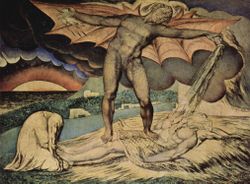 Satan Inflicting Plagues on Job (watercolor by William Blake from his 1826 Illustrations of the Book of Job)
Satan Inflicting Plagues on Job (watercolor by William Blake from his 1826 Illustrations of the Book of Job)
The Gemara expanded on the conversation between God and Satan in Job 1:6–8 to teach that Abraham’s patience in receiving the Promised Land even in the face of the need to buy land to bury his wife in Genesis 23:3–16 showed faith comparable to that of Job. Job 1:6–7 begins: “Now one day the sons of God came to present themselves before the Lord, and Satan came among them. And the Lord said to Satan: ‘From where do you come?’ Then Satan answered. . . .” The Gemara taught that Satan then told God: “Sovereign of the Universe, I have traversed the whole world and found none so faithful as Your servant Abraham. For You said to him, ‘Arise, walk through the land in the length of it and in the breadth of it; for to you will I give it’ (Genesis 13:17), and even so, when he was unable to find any place in which to bury Sarah until he bought one for 400 shekels of silver, he did not complain against Your ways.” Only then did God say to Satan the words of Job 1:8, “Have you considered my servant Job? For there is none like him in the earth . . . .” (Babylonian Talmud Bava Batra 15b.)
Rabbi Berekiah and Rabbi Helbo taught in the name of Rabbi Samuel bar Nahman that the Valley of Siddim (mentioned in Genesis 14:3 in connection with the battle between the four kings and the five kings) was called the Valley of Shaveh (which means "as one") because there all the peoples of the world agreed as one, felled cedars, erected a large dais for Abraham, set him on top, and praised him, saying (in the words of Genesis 23:6,) "Hear us, my lord: you are a prince of God among us." They told Abraham that he was king over them and a god to them. But Abraham replied that the world did not lack its King, and the world did not lack its God. (Genesis Rabbah 42:5.)
A midrash taught that Abraham said (beginning with the words of Genesis 22:1 and 22:11), "'Here I am' — ready for priesthood, ready for kingship" (ready to serve God in whatever role God chose), and Abraham attained both priesthood and kingship. He attained priesthood, as Psalm 110:4 says, "The Lord has sworn, and will not repent: 'You are a priest forever after the manner of Melchizedek." And he attained kingship, as Genesis 23:6 says, "You are a mighty prince among us." (Genesis Rabbah 55:6.)
Rav and Samuel differed as to its meaning of “Machpelah” — meaning “double cave” — in Genesis 23:9. One held that the cave consisted of two chambers one within the other, and the other held that it consisted of a lower and upper chamber. According to one, the term “double cave” meant that it was the burial place of multiple couples — Adam and Eve, Abraham and Sarah, Isaac and Rebekah, and Jacob and Leah. (Babylonian Talmud Eruvin 53a.)
The Gemara deduced from the use of the term “take” in Genesis 23:13 that “taking” means by monetary exchange. And thus the Gemara deduced that money effects betrothal by noting the common use of “take” in Genesis 23:13 and in Deuteronomy 22:13, in the words, “If any man take a wife.” (Babylonian Talmud Kiddushin 2a–b, 4b.)
The Mishnah attributed to Abraham a good eye (a magnanimous spirit in financial matters, based, for example, on Abraham's generous and ungrudging nature in his dealings with Ephron the Hittite in Genesis 23:16). (Mishnah Avot 5:19.)
Rabbi Haninah taught that every time the Torah refers to silver coin (שֶׁקֶל כֶּסֶף, shekel kesef) without any qualification, it means a sela (shekel), except for the silver coin that Genesis 23:16 cites in the transaction with Ephron. For although Genesis 23:16 mentions the coinage without qualification, it means centenaria (worth 100 shekels each), because Genesis 23:16 says: "400 shekels of silver current money with the merchant" (implying that wherever there were merchants, these shekels had to be accepted as such), and there is a place where they call centenaria "shekels." (Babylonian Talmud Bekhorot 50a.)
Rav Judah said in the name of Rav that Genesis 23:17, which says, "So the field of Efron which was in Machpelah . . . and all the trees that were in the field that were in the border thereof," indicates that Abraham in buying the field acquired all the small trees that were identified by their surrounding boundary. But the purchase did not include those large, distinctive trees that did not require a surrounding boundary for people to know to whom they belonged. And Rav Mesharsheya deduced from Genesis 23:17 that one who buys a field also gains title to the border strips and the trees on these strips surrounding the field. (Babylonian Talmud Bava Batra 69b.)
Genesis chapter 24
The Mishnah and Tosefta deduced from Genesis 24:1 that God blessed Abraham in his old age because (as the Mishnah deduced from Genesis 26:5) he kept the entire Torah even before it was revealed. (Mishnah Kiddushin 4:14; Tosefta Kiddushin 5:17.) And the Tosefta deduced from the contrast between the plenty indicated in Genesis 24:1 and the famine indicated in Genesis 26:1 that God gave the people food and drink and a glimpse of the world to come while the righteous Abraham was alive, so that the people might understand what it had lost when he was gone. (Tosefta Sotah 10:5.)
Rabbi Hama ben Hanina taught that our ancestors were never without a scholars’ council. Abraham was an elder and a member of the scholars’ council, as Genesis 24:1 says, “And Abraham was an elder (זָקֵן, zaken) well stricken in age.” Eliezer, Abraham’s servant, was an elder and a member of the scholars’ council, as Genesis 24:2 says, “And Abraham said to his servant, the elder of his house, who ruled over all he had,” which Rabbi Eleazar explained to mean that he ruled over — and thus knew and had control of — the Torah of his master. Isaac was an elder and a member of the scholars’ council, as Genesis 27:1 says: “And it came to pass when Isaac was an elder (זָקֵן, zaken).” Jacob was an elder and a member of the scholars’ council, as Genesis 48:10 says, “Now the eyes of Israel were dim with age (זֹּקֶן, zoken).” In Egypt they had the scholars’ council, as Exodus 3:16 says, “Go and gather the elders of Israel together.” And in the Wilderness, they had the scholars’ council, as in Numbers 11:16, God directed Moses to “Gather . . . 70 men of the elders of Israel.” (Babylonian Talmud Yoma 28b.)
The Tosefta reported that Jewish judicial proceedings adopted the oath that Abraham imposed in Genesis 24:3. (Tosefta Sotah 7:3.) And Rav Judah said that Rav said that the judge adjures the witness with the oath stated in Genesis 24:3, “And I will make you swear by the Lord, the God of heaven.” Ravina explained that this accorded with the view of Rabbi Haninah bar Idi, who said that Jewish judicial proceedings require swearing by the Name of God. Rav Ashi replied that one might even say that it accorded with the view of the Rabbis, who said that a witness can be adjured with a Substitute for the Name of God. They concluded that the witness needs to hold something sacred in his hand, as Abraham’s servant did when in Genesis 24:9 he put his hand under Abraham’s thigh and held Abraham’s circumcision. Rava said that a judge who adjures by “the Lord God of heaven” without having the witness hold a sacred object errs and has to repeat the swearing correctly. Rav Papa said that a judge who adjures with tefillin errs and has to repeat the swearing. The law follows Rava, but not Rav Papa, as tefillin are considered sacred. (Babylonian Talmud Shevuot 38b.)
Reading the report of Genesis 24:10 that Abraham’s servant had “all the goods of his master's in his hand,” Rabbi Helbo explained that this was a deed of gift (made by Abraham of all his wealth to Isaac, so that a bride would be more eager to marry him). (Genesis Rabbah 59:11.)
Rabbi Samuel bar Nahmani said in the name of Rabbi Jonathan that Abraham’s servant Eliezer made an improper request when in Genesis 24:14 he asked God to grant that the young woman whom he would ask to draw water for him and who replied by offering also to water his camels might be the one whom God had decreed for Isaac. Rabbi Samuel asked what would have happened if she had happened to be lame or blind, and concluded that Eliezer was fortunate that Providence answered him by sending Rebekah to meet him. Rabbi Samuel compared Eliezer’s request to the improvident oaths that Saul made in 1 Samuel 17:25 when he promised his daughter to the man who would kill Goliath and that Jephthah made in Judges 11:31 when he promised to sacrifice whatever came out of his house to meet him on his return. (Babylonian Talmud Taanit 4a.) And Rav cited Eliezer’s request in Genesis 24:14 along with the omen sought by Jonathan in 1 Samuel 14:9–10 as forms of improper acts of divination. (Babylonian Talmud Chullin 95b.)
Rabbi Simeon bar Yohai taught that God answered three men even while their petition was still on their lips: Abraham’s servant Eliezer, Moses, and Solomon. With regard to Eliezer, Genesis 24:15 reports: “And it came to pass, before he had done speaking, that, behold, Rebekah came out.” With regard to Moses, Numbers 16:31 reports: “And it came to pass, as he made an end of speaking all these words, that the ground did cleave asunder.” And with regard to Solomon, 2 Chronicles 7:1 reports: “Now when Solomon had made an end of praying, the fire came down from heaven.” (Genesis Rabbah 60:4.)
Rav Nahman bar Isaac cited a Tanna that interpreted Genesis 24:16 to teach that Rebekah was virgin between the ages of 12 and 12½ (a naarah) when Abraham’s servant encountered her. (Babylonian Talmud Yevamot 61b.)
The Rabbis read the words “And I came this day to the well” in Genesis 24:42 to imply that Eliezer had set out that day from Abraham’s household and arrived on the same day in Aram-Naharaim. The Rabbis thus taught that the earth shrank to speed Eliezer’s journey, as it would again for Jacob (as implied in Genesis 28:10–11) and Abishai the son of Zeruiah. (Babylonian Talmud Sanhedrin 95a–b.)
Rabbi Isaac called Bethuel a wicked man. (Babylonian Talmud Yevamot 64a; see also Genesis Rabbah 60:12 (wicked); 63:4 (a rogue); Leviticus Rabbah 23:1 (a deceiver); Song of Songs Rabbah 2:4 (a trickster).) A midrash identified Bethuel as a king. (Numbers Rabbah 14:11.)
Rav in the name of Rabbi Reuben ben Estrobile cited Laban’s and Bethuel’s response to Abraham’s servant that “The matter was decreed by the Lord” in Genesis 24:50–51 as a proof text for the proposition that God destines a woman and a man for each other in marriage. (Babylonian Talmud Mo'ed Katan 18b; see also Genesis Rabbah 68:3.) Rabbi Joshua ben Rabbi Nehemiah in the name of Rabbi Haninah ben Isaac said that the decree with regard to Rebekah that Laban and Bethuel acknowledged came from Mount Moriah. (Genesis Rabbah 60:10.)
Noting that Genesis 24:55 reports that the next day, Rebekah’s “brother and her mother said, ‘Let the maiden remain with us some ten days’” (Genesis 24:55), the Rabbis asked where Bethuel was. The midrash concluded that Bethuel wished to hinder Rebekah’s marriage, and so he was smitten during the night. (Genesis Rabbah 60:12.) The Rabbis said that Abraham’s servant did not disclose Bethuel’s fate to Isaac. (Genesis Rabbah 60:15.)
Rav Hisda interpreted the word “days” (יָמִים, yamim) in Genesis 24:55 to mean “a year.” Genesis 24:55 says, “And her brother and her mother said: ‘Let the maiden abide with us yamim, at the least ten.” The Gemara reasoned that if יָמִים, yamim, in Genesis 24:55 means “days” and thus to imply “two days” (as the plural implies more than one), then Genesis 24:55 would report Rebekah’s brother and mother suggesting first two days, and then when Eliezer said that that was too long, nonsensically suggesting ten days. The Gemara thus deduced that יָמִים, yamim, must mean “a year,” as Leviticus 25:29 implies when it says, “if a man sells a house in a walled city, then he may redeem it within a whole year after it is sold; for a full year (יָמִים, yamim) shall he have the right of redemption.” Thus Genesis 24:55 might mean, “Let the maiden abide with us a year, or at the least ten months.” The Gemara then suggested that יָמִים, yamim, might mean “a month,” as Numbers 11:20 suggests when it uses the phrase “a month of days (יָמִים, yamim).” The Gemara concluded, however, that יָמִים, yamim, means “a month” only when the term “month” is specifically mentioned, but otherwise means either “days” (at least two) or “a year.” (Babylonian Talmud Ketubot 57b.) Similarly, the Mishnah taught that they allowed a virgin 12 months to prepare for her wedding after her fiancé told her to prepare. (Mishnah Ketubot 5:2; Babylonian Talmud Ketubot 57a.)
A midrash noted that in Genesis 24:57, Rebekah’s brother and mother asked Rebekah if she assented to going with Abraham’s servant to marry Isaac. The midrash deduced from this inquiry that a fatherless maiden may not be given in marriage without her consent. (Genesis Rabbah 60:12.)
Rabbi Joshua ben Levi (according to the Jerusalem Talmud) or a Baraita in accordance with the opinion of Rabbi Yose the son of Rabbi Chaninah (according to the Babylonian Talmud) said that the three daily prayers derived from the Patriarchs, and cited Genesis 24:63 for the proposition that Jews derived the afternoon prayer from Isaac, arguing that within the meaning of Genesis 24:63, “speak” meant “pray,” just as it did in Psalm 102:1. (Jerusalem Talmud Berakhot 43a; Babylonian Talmud Berakhot 26b.)
Genesis chapter 25
Rabbi Judah said that Keturah was another name for Hagar. (Genesis Rabbah 61:4.)
Rabbi Hama son of Rabbi Haninah taught that Genesis 25:11 shows God comforting the mourning Isaac, and thus demonstrates one of God’s attributes that humans should emulate. Rabbi Hama son of Rabbi Haninah asked what Deuteronomy 13:5 means in the text, “You shall walk after the Lord your God.” How can a human being walk after God, when Deuteronomy 4:24 says, “[T]he Lord your God is a devouring fire”? Rabbi Hama son of Rabbi Haninah explained that the command to walk after God means to walk after the attributes of God. As God clothes the naked — for Genesis 3:21 says, “And the Lord God made for Adam and for his wife coats of skin, and clothed them” — so should we also clothe the naked. God visited the sick — for Genesis 18:1 says, “And the Lord appeared to him by the oaks of Mamre” (after Abraham was circumcised in Genesis 17:26) — so should we also visit the sick. God comforted mourners — for Genesis 25:11 says, “And it came to pass after the death of Abraham, that God blessed Isaac his son” — so should we also comfort mourners. God buried the dead — for Deuteronomy 34:6 says, “And He buried him in the valley” — so should we also bury the dead. (Babylonian Talmud Sotah 14a.) Similarly, the Sifre on Deuteronomy 11:22 taught that to walk in God’s ways means to be (in the words of Exodus 34:6) “merciful and gracious.” (Sifre to Deuteronomy 49:1.)
Commandments
According to Maimonides and Sefer ha-Chinuch, there are no commandments in the parshah. (Maimonides. Mishneh Torah. Cairo, Egypt, 1170–1180. Reprinted in Maimonides. The Commandments: Sefer Ha-Mitzvoth of Maimonides. Translated by Charles B. Chavel, 2 vols. London: Soncino Press, 1967. ISBN 0-900689-71-4. Sefer HaHinnuch: The Book of [Mitzvah] Education. Translated by Charles Wengrov, 1:87. Jerusalem: Feldheim Pub., 1991. ISBN 0-87306-179-9.)
Haftarah
The haftarah for the parshah is:
- for Ashkenazi Jews, Sephardi Jews, and Dardai communities: 1 Kings 1:1-31
- for Yemenite Jews: 1 Kings 1:1-36,46
- for Karaite Jews: Isaiah 51:2-22
- for Italian Jews: 1 Kings 1:1-34
In the liturgy
In the Blessing after Meals (Birkat Hamazon), at the close of the fourth blessing (of thanks for God’s goodness), Jews allude to God’s blessing of the Patriarchs described in Gensis 24:1, 27:33 and 33:11. (Menachem Davis. The Schottenstein Edition Siddur for the Sabbath and Festivals with an Interlinear Translation, 172. Brooklyn: Mesorah Publications, 2002. ISBN 1-57819-697-3. Reuven Hammer. Or Hadash: A Commentary on Siddur Sim Shalom for Shabbat and Festivals, 342. New York: The Rabbinical Assembly, 2003. ISBN 0-916219-20-8.)
The Sages deduced from Isaac’s “meditation . . . toward evening” in Genesis 24:63 that Isaac began the practice of the afternoon Mincha prayer service. (Hammer at 1.)
The Weekly Maqam
In the Weekly Maqam, Sephardi Jews each week base the songs of the services on the content of that week's parasha. For parshah Chayei Sarah, Sephardi Jews apply Maqam Hijaz, the maqam that expresses mourning and sadness. This maqam is appropriate here, because it is the parshah that contains the deaths of both Sarah and Abraham.
Further reading
The parshah has parallels or is discussed in these sources:
Biblical
- Genesis 29:1–12 (courtship at the well).
- Exodus 2:15–21 (courtship at the well).
Classical rabbinic
- Mishnah: Kiddushin 4:14; Avot 5:19. Land of Israel, circa 200 C.E. Reprinted in, e.g., The Mishnah: A New Translation. Translated by Jacob Neusner. New Haven: Yale University Press, 1988. ISBN 0-300-05022-4.
- Tosefta: Sotah 7:3, 10:5; Kiddushin 5:17. Land of Israel, circa 300 C.E. Reprinted in, e.g., The Tosefta: Translated from the Hebrew, with a New Introduction. Translated by Jacob Neusner. Peabody, Mass.: Hendrickson Pub., 2002. ISBN 1-56563-642-2.
- Jerusalem Talmud: Berakhot 43a; Orlah 9b. Land of Israel, circa 400 C.E. Reprinted in, e.g., Talmud Yerushalmi. Edited by Chaim Malinowitz, Yisroel Simcha Schorr, and Mordechai Marcus, vols. 1, 12. Brooklyn: Mesorah Pubs., 2005–2009.
- Genesis Rabbah 8:13; 38:10; 42:5; 45:9; 48:16; 55:6; 58:1–62:5; 65:9; 66:4; 68:2–4, 9; 70:12; 79:7; 85:7; 96; 97. Land of Israel, 5th Century. Reprinted in, e.g., Midrash Rabbah: Genesis. Translated by H. Freedman and Maurice Simon. London: Soncino Press, 1939. ISBN 0-900689-38-2.
- Leviticus Rabbah 19:5; 20:11; 30:10; 37:4. Land of Israel, 5th Century. Reprinted in, e.g., Midrash Rabbah: Leviticus. Translated by H. Freedman and Maurice Simon. London: Soncino Press, 1939. ISBN 0-900689-38-2.
- Babylonian Talmud: Berakhot 18a, 26b, 61a; Shabbat 62b, 77a; Eruvin 18b, 53a; Pesachim 3a; Yoma 28b; Taanit 4a; Megillah 17a; Moed Katan 18b; Yevamot 61b; Ketubot 57b; Nedarim 41b; Sotah 5a, 14a; Gittin 76a; Kiddushin 2a, 4b, 82a; Bava Kamma 92b; Bava Metzia 87a; Bava Batra 16b, 69b, 141a; Sanhedrin 46b, 59b, 91a, 95a, 107b; Shevuot 38b; Avodah Zarah 7b; Zevachim 62b; Chullin 95b, 120a; Bekhorot 50a. Babylonia, 6th Century. Reprinted in, e.g., Talmud Bavli. Edited by Yisroel Simcha Schorr, Chaim Malinowitz, and Mordechai Marcus, 72 vols. Brooklyn: Mesorah Pubs., 2006.
Medieval
- Deuteronomy Rabbah 2:11; 9:4; 11:1. Land of Israel, 9th Century. Reprinted in, e.g., Midrash Rabbah: Deuteronomy. Translated by H. Freedman and Maurice Simon. London: Soncino Press, 1939. ISBN 0-900689-38-2.
- Exodus Rabbah 1:32; 31:17; 32:9. 10th Century. Reprinted in, e.g., Midrash Rabbah: Exodus. Translated by S. M. Lehrman. London: Soncino Press, 1939. ISBN 0-900689-38-2.
- Song of Songs Rabbah 2:41; 3:8.
- Ruth Rabbah 4:3; 7:12.
- Lamentations Rabbah 1:19.
- Ecclesiastes Rabbah 2:30.
- Esther Rabbah 2:9.
- Solomon ibn Gabirol. A Crown for the King, 16:199–200; 22:269–70. Spain, 11th Century. Translated by David R. Slavitt, 28–29, 36–37. New York: Oxford University Press, 1998. ISBN 0-19-511962-2.
- Rashi. Commentary. Genesis 23–25. Troyes, France, late 11th Century. Reprinted in, e.g., Rashi. The Torah: With Rashi’s Commentary Translated, Annotated, and Elucidated. Translated and annotated by Yisrael Isser Zvi Herczeg, 1:241–70. Brooklyn: Mesorah Publications, 1995. ISBN 0-89906-026-9.
- Numbers Rabbah 2:1, 26; 10:5; 14:10–11; 15:12; 19:32; 21:20. 12th Century. Reprinted in, e.g., Midrash Rabbah: Numbers. Translated by Judah J. Slotki. London: Soncino Press, 1939. ISBN 0-900689-38-2.
- Zohar 1:21a, 50a, 100b, 103a, 121a–34a, 135b, 141a, 142a, 181b, 187a, 223a, 224a; 2:39b, 236a; 3:103a, 148b, 158a; Raya Mehemna 60a. Spain, late 13th Century. Reprinted in, e.g., The Zohar. Translated by Harry Sperling and Maurice Simon. 5 vols. London: Soncino Press, 1934.
Modern
- Emily Dickinson. Poem 506 (He touched me, so I live to know). 1862. In The Complete Poems of Emily Dickinson. Edited by Thomas H. Johnson, 246. New York: Little, Brown & Co., 1960. ISBN 0-316-18414-4.
- Thomas Mann. Joseph and His Brothers. Translated by John E. Woods, 11, 58, 93–94, 100, 127–28, 130, 133–34, 173, 185, 187, 203, 339–43, 353–54, 394–95, 476–77, 492–93, 496–98, 623, 779, 806. New York: Alfred A. Knopf, 2005. ISBN 1-4000-4001-9. Originally published as Joseph und seine Brüder. Stockholm: Bermann-Fischer Verlag, 1943.
- Martin Buber. On the Bible: Eighteen studies, 22–43. New York: Schocken Books, 1968.
- R. David Freedman. “‘Put Your Hand Under My Thigh’—The Patriarchal Oath.” Biblical Archaeology Review 2 (2) (June 1976).
- Marc Gellman. “Rebekah and the Camel Who Made No Noise.” In Does God Have a Big Toe? Stories About Stories in the Bible, 53–56. New York: HarperCollins, 1989. ISBN 0-06-022432-0.
- Aaron Wildavsky. Assimilation versus Separation: Joseph the Administrator and the Politics of Religion in Biblical Israel, 6–7. New Brunswick, N.J.: Transaction Publishers, 1993. ISBN 1-56000-081-3.
- Joseph Telushkin. The Ten Commandments of Character: Essential Advice for Living an Honorable, Ethical, Honest Life, 50–51. New York: Bell Tower, 2003. ISBN 1-4000-4509-6.
- Suzanne A. Brody. “Rebecca’s Goodbye.” In Dancing in the White Spaces: The Yearly Torah Cycle and More Poems, 66. Shelbyville, Kentucky: Wasteland Press, 2007. ISBN 1-60047-112-9.
- Esther Jungreis. Life Is a Test, 130, 134. Brooklyn: Shaar Press, 2007. ISBN 1-4226-0609-0.
External links
Texts
Commentaries
- Academy for Jewish Religion, California
- Academy for Jewish Religion, New York
- Aish.com
- American Jewish University
- Bar-Ilan University
- Chabad.org
- eparsha.com
- G-dcast
- The Israel Koschitzky Virtual Beit Midrash
- Jewish Agency for Israel
- Jewish Theological Seminary
- Miriam Aflalo
- MyJewishLearning.com
- Ohr Sameach
- Orthodox Union
- OzTorah, Torah from Australia
- Oz Ve Shalom — Netivot Shalom
- Pardes from Jerusalem
- Parshah Parts
- Rabbi Dov Linzer
- RabbiShimon.com
- Rabbi Shlomo Riskin
- Rabbi Shmuel Herzfeld
- Reconstructionist Judaism
- Sephardic Institute
- Shiur.com
- 613.org Jewish Torah Audio
- Tanach Study Center
- Teach613.org, Torah Education at Cherry Hill
- Torah from Dixie
- Torah.org
- TorahVort.com
- Union for Reform Judaism
- United Hebrew Congregations of the Commonwealth
- United Synagogue of Conservative Judaism
- What’s Bothering Rashi?
- Yeshivat Chovevei Torah
- Yeshiva University
Weekly Torah Portions Genesis 
Exodus Leviticus Numbers Deuteronomy Devarim · Va'etchanan · Eikev · Re'eh · Shoftim · Ki Teitzei · Ki Tavo · Nitzavim · Vayelech · Haazinu · V'Zot HaBerachahCategories:- Weekly Torah readings
- Book of Genesis
Wikimedia Foundation. 2010.

